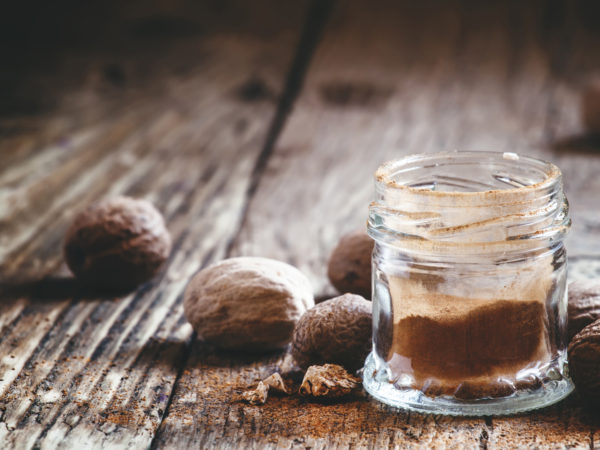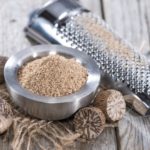Getting High On Nutmeg?
Can you really get high on nutmeg? It sounds so unlikely to me, but I recently heard about someone getting sick after trying it.
Andrew Weil, M.D. | April 1, 2022

As unlikely as it seems, yes, it’s true that you can get high on nutmeg, but I doubt that you would enjoy it very much. I also predict that anyone who attempted it would likely never try it again.
Nutmeg contains small amounts of myristicin, a compound distantly related to mescaline, the active compound in peyote, that may be converted in the body to an amphetamine-like psychedelic.
The tiny amount of myristicin found in the spice means that you would have to consume an awful lot of nutmeg to get high, from around two tablespoons up to a whole container. Nutmeg is used only in very small quantities in cooking and baking – typically only a quarter-teaspoon goes into a cake, pie, or eggnog recipe. Ground nutmeg straight from the can tastes pretty awful, especially in large amounts.
If you do manage to swallow enough, the effects can be variable, ranging from a mild floating sensation, accompanied by anxiety, fear, and a feeling of impending doom, to full-blown delirium. These don’t occur immediately; you may have to wait up to four hours for the effects, which can be long-lasting (up to 48 hours if you swallow a lot). The after-effects are memorable and pretty miserable: a heavy hangover and nasty gastrointestinal upset including nausea, vomiting, and diarrhea. In addition, your heart can race uncomfortably. The toxic effects are so unpleasant that very few people give nutmeg a second try.
According to the Journal of Medical Toxicology, nutmeg poisoning is quite rare and often times unintentional among small children who accidentally inhale or get the powder in their eyes. Those in early adolescence are most likely to experiment with nutmeg because it is more easily obtained, less expensive than street drugs, and legal. But the experience is so negative that perhaps those who have tried it will spread the word that it’s not worth the trouble.
Andrew Weil, M.D.
Sources:
ncbi.nlm.nih.gov/pmc/articles/PMC1726685/pdf/v022p00223.pdf
ncbi.nlm.nih.gov/pmc/articles/PMC4057546/
ncbi.nlm.nih.gov/pmc/articles/PMC1726685/pdf/v022p00223.pdf
link.springer.com/article/10.1007/s13181-013-0379-7#/page-1
Johnson-Arbor K, Smolinske S. Stoned on spices: a mini-review of three commonly abused household spices. Clin Toxicol (Phila). 2021 Feb;59(2):101-105. doi: 10.1080/15563650.2020.1840579. Epub 2020 Nov 16. PMID: 33191804. https://pubmed.ncbi.nlm.nih.gov/33191804/
Origionally posted December 2016, Updated April 2022












